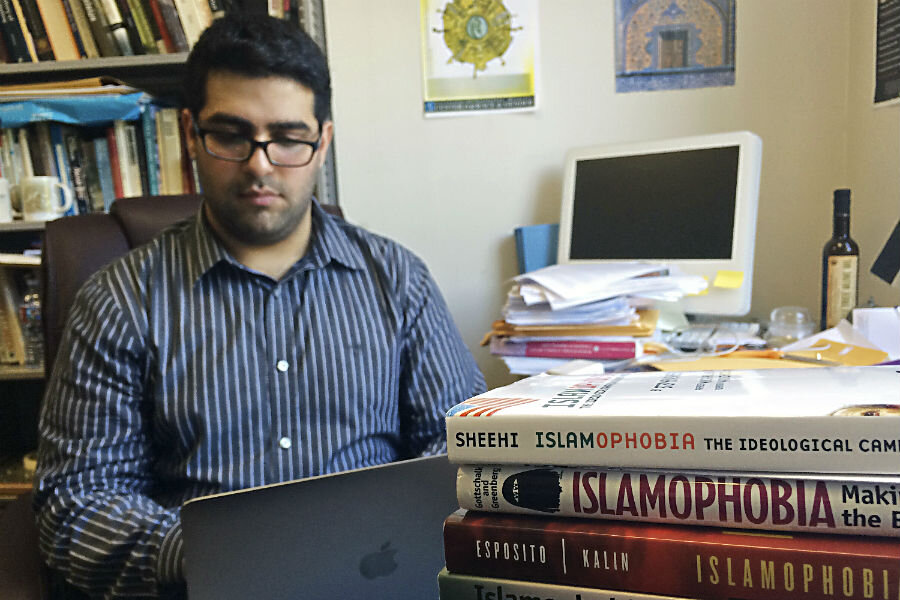As 'Islamophobia' swells, flight attendants balance fear and safety
Loading...
The ejection of an Arabic-speaking college student from a Southwest Airlines flight has sparked a heated debate about how airlines should respond to passenger concerns about terrorism while avoiding discrimination.
University of California, Berkeley senior Khairuldeen Makhzoomi was removed from his Los Angeles to Oakland, Calif. flight on April 9 after another passenger reported that Mr. Makhzoomi said something in Arabic that disturbed her. Southwest says it was required by federal law to investigate the "potential threat," eventually resulting in Makhzoomi being asked to leave the aircraft.
Flight attendants have long served as mediators of passenger disputes, ranging from the mundane quibble over armrests to more serious allegations of harassment. They are also charged with the weighty task of balancing passenger fears and safety – a responsibility that has become even more prevalent amid heightened concerns relating to terrorism following attacks in recent years and months.
Makhzoomi says he was speaking to his uncle on a cell phone after attending a speech by United Nations Secretary General Ban Ki-moon, and mentioned Islamic State during their conversation. He ended the call by saying, "inshallah," Arabic for "God willing." Minutes after he ended the call, a Southwest employee told him to exit the plane, he said.
The airline says it was "the content of [Makhzoomi's] conversation, not the language used," that led to his removal, adding that "Southwest neither condones nor tolerates discrimination of any kind."
Makhzoomi said he was "intimidated" by the process, and blamed anti-Muslim sentiment for contributing to his experience. He also said he spoke to the airline and requested a public apology, but had not yet gotten a response.
"It was an overwhelming process. They made me feel as if I were guilty," he told the Associated Press.
Former flight attendant Gillian Brockell writes in The Washington Post that similar situations are common, with airline personnel frequently "asked to be someone's accomplice — in their racism, their homophobia, their cruel joke about the larger person seated next to them or their conviction that the mother in front of them should drug their child to shut them up."
Ms. Brockell added that she was "not surprised to hear" of Makhzoomi's plight.
Zahra Billoo, the executive director of the San Francisco Bay Area Council on American-Islamic Relations, told The New York Times that at least six Muslims have been removed from flights under similar circumstances this year alone.
Just last week, a Maryland Muslim woman says she was removed from a Seattle-bound Southwest flight in Chicago after she requested to change seats, WJZ-TV reported. The woman, Hakima Abdulle, says she was wearing a hijab at the time, and was kicked off the plane without explanation.
"She was humiliated because of her religion and the way she dressed," her husband, Abukar Fadaw, said.
That incident led to a call for an investigation into potential bias from the Council on American-Islamic Relations (CAIR).
These incidents come at a time when anti-Islam sentiment appears to be rising in the United States, with high-profile figures such as presidential candidates Ted Cruz and Donald Trump calling for freezes on Muslim immigration, and the patrolling of Muslim neighborhoods.
The public policy blog ThinkProgress has tracked more than 60 anti-Muslim incidents ranging from harassment to shootings, all since the November Paris terror attacks.
Makhzoomi hopes the attention around his eviction from the Southwest flight will lead to thoughtful dialogue about how to address fears relating to Islamic extremism.
"I hope I can get that apology because we need to solve this problem," Makhzoomi said, according to the AP. "But we cannot solve any problem without mentioning what is the problem and that is that Islamophobia is real and it's been used by many people and it's time to say enough is enough."
This report contains material from the Associated Press.






